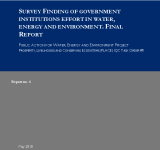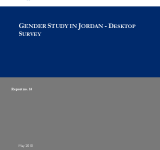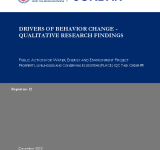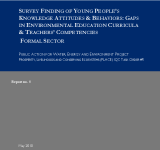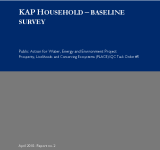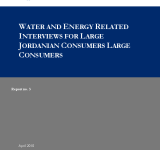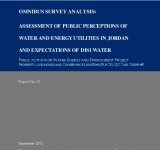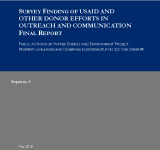The report presents the findings of the government institutions efforts survey;; which is designed for the purpose of reviewing the government agencies’ current and past communication activities in water;; energy and environment. The specific objective of this survey is to review the Donor Position Paper on Outreach targeted sample of 36 staff from 22 government institutions from Aqaba and Karak. As part of the Public Action for Water;; Energy and Environment Project (PAP);; a public education and behavior change communication program developed to support USAID’s technical and policy investments in the Jordanian water and energy sectors;; this report finds that many government institutions have more than one role;; overseeing solid waste management;; industrial water and reuse and environmental laws. The report also finds that the communications programs are scattered and credibility and trust between service agencies and their clients is a concern. The interview analysis suggests that the Public Action Project needs to focus on two or three specific areas;; and the report recommends all capacity building activities to be focused on one goal of developing;; implementing and measuring national communication strategies and action plans.
Public Action Project
The report presents the findings of a desktop survey conducted to review gender studies in Jordan with an overall goal of the survey as to ensure that gender is adequately addressed throughout project research;; analysis and activities of the Public Action for Water;; Energy and Environment Project (PAP). Under the PAP mandate to encourage water and energy conservation and to support behavior change towards more conservation and efficient practices both at the household level and in the commercial;; industrial and civil society arenas using social marketing behavioral methods;; the report is based on a gender desktop review of existing research on gender and natural resource management in Jordan. It capitalizes on the growing body of research on gender across sectors in Jordan including natural resource management;; to apply and adapt the findings to the PAP project activities. The report concludes with recommendations for the PAP projects such as donor collaboration;; improvement of women’s knowledge of water and energy saving methods;; engagement and creation of women’s participation to promote and support opportunities for small;; women-owned business promoting water and energy saving technologies and promotion of alternative technologies.
The report aims to understand the outlook of Jordanians;; the key determinants of behavioral change in search for “drivers” that can be used in programs promoting conservation of water or energy and reduction of solid waste. This research was conducted as part of the Public Action for Water;; Energy and Environment Project (PAP);; which aims to encourage water and energy conservation and to support behavior change towards more conservation and efficient practices both at the household level and in the commercial;; industrial and civil society arenas using social marketing behavioral methods. It is based on the qualitative research that focuses on identifying people’s motivations;; needs and desires to help formulating social marketing programs and developing adaptive capacity in individuals and groups. Some of the key questions of the qualitative research include “What are the current coping behaviors and attitudes (psychological;; social;; etc …) of the Jordanian public (disaggregated by gender;; age;; geography and income) in the face of limited water availability and high prices for energy?;; What anticipated consequences may the Government face if stricter scenarios were imposed on water and energy? The report recommends the Ministry of Education to cooperate and introduce regular classes that focus on showing youth the direct impact of water;; energy and environment on their lives and raise awareness and consciousness of children regarding their role in the environment and influence it in a positive way.
The report aims to learn about young people's knowledge;; attitudes;; and behaviors with regards to water conservation;; energy conservation;; and waste management;; and it assess these against the learning objectives of the curriculum. It discovers that students' knowledge was sufficient and at times more sophisticated than that founded in the curriculum even though their attitudes and behaviors remain largely unchanged. The object of the survey pertains to the objectives of the Public Action for Water;; Energy;; and Environment Project;; which revolve around education for young people;; teachers and youth leaders to develop their knowledge and ethical values and attitudes. The survey focuses on assessing young people and educator's current awareness of water and energy resources and waste reduction and evaluating formal curriculum resources. The report points at the gap of translating young people's knowledge into genuine interest;; concern and action and proposes set of targeted actions including development of relevant resources and additional supplemental materials;; age-relevant projects to support environmental concepts in the national curriculum and assignment of environmental coordinator at all schools.
The report is based on the KAP household baseline survey;; which measures the current awareness of methods of water and energy conservations to determine how the Jordanians currently dispose of their household waste and how serious they believe the threat of global warming to be in Jordan. The household baseline survey on the use of water;; energy;; and the management of solid household waste has been designed based on the Knowledge;; Attitude and Practice (KAP) model;; and it aims to serve as a prelude to education and changing public behavior in the water and energy sectors in Jordan;; and to supply specific initiatives in the environment;; in particular in regard to the management of solid household waste. The research is based on a qualitative research;; a questionnaire and semi-structured interviews. The report concludes with the main findings that the most trusted sources of information on water conservation were the Ministry of Water and Irrigation;; and the Jordan Water Company. The survey finds that the respondents believe that the water shortage can be overcome with the water authorities' leadership including their engagement in grand projects.
The report aims to better understand and quantify the attitude and the levels of awareness amongst large consumers of water and energy;; and it presents the findings of the interviews conducted with a representative sample of large consumers to better understand trends and behaviors related to water and energy consumption. The research was conducted as part of the Jordan Public Action in Water;; Energy;; and Environment Project (PAP) under the Prosperity;; Livelihoods;; and Conserving Ecosystems (PLACE);; which aims to initiate and establish clear and identifiable behavioral changes amongst the Jordanian public and decision-makers. The study categorizes large consumers into a number of main sectors including hotel and restaurant sectors;; commercial sector;; hospitals;; government buildings and industrial sector;; and the field surveys were collected as a random sample of different industries;; state and commercial buildings. The research finds that the majority of large consumers neither monitor their water nor their energy consumptions via sub-metering scheme;; showing that the majority of large consumers are not able to accurately determine the areas within their establishments that are the most consuming. This finding identifies four major obstacles in implementing the water and energy saving practices including;; lack of awareness;; lack of incentive programs amongst employees;; higher prices for higher quality savings devices and lack of proper maintenance.
The report aims to determine public attitudes towards water and energy utilities and assess public perception of Disi water;; scheduled to begin serving Amman residents in 2012. It is based on an omnibus survey;; structured;; quantitative and in-person interviews with 1000 respondents representing adult males and females across the twelve governorates of Jordan. This research is part of the was conducted as part of the Public Action in Water;; Energy;; and Environmental Project to initiate and establish clear and identifiable behavioral changes amongst the Jordanian public and decision-makers;; to lead to increased efficiency in the use of water and energy;; and to improve solid waste handling practices. The findings of the survey show that while a majority of respondents could correctly identify their water provider;; nearly a quarter could not and more than half of the respondents believe they are paying water rates that are unreasonable for the quality of water service they receive. The report confirm that the customer experience with both water and electrical utility companies can be improved and increasing awareness of the sound quality of the Disi water would support the public perceptions to continue to shift in a positive direction.
The report is based on the outreach and communication survey of USAID and other donors' efforts. It is part of the Public Action Project;; which supports USAID's technical and policy investments in the Jordanian water and energy sectors and specific initiatives in the environment. The survey was designed to report on past;; current and planned donor efforts in relation to water;; energy and solid waste management – with the main focus on water sector. It is intended to help the PAP team to design communication strategies and specific behavior change campaigns by building on lessons learned from outreach efforts. The report is based on the survey consisting of 39 open-ended interviews with donor officials and managers of donor-funded projects;; and it includes analysis and recommendations on coordination with current and planned donor projects. The report recommends improvement in coordination through development of national communication strategies;; assistance in water and energy sectors to establish trust and credibility with their customers;; reduction and streamlining of programs targeting schoolchildren;; and setting up of priority areas for change through technical assessment in water and energy.
